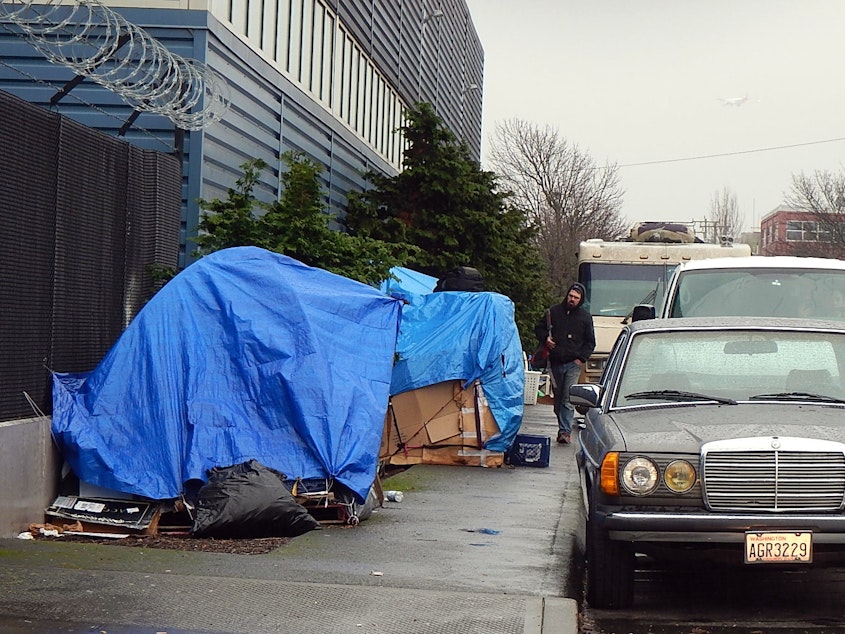Limited bathroom access, business closures leave Seattle's homeless population vulnerable amid Covid-19 pandemic

The situation is desperate for people experiencing homelessness and living outside in the Seattle area. That’s what Seattle city council members heard from service providers during a briefing Wednesday.
People who are homeless currently face twin threats: The coronavirus outbreak and a surge in hepatitis A cases among the population.
In March alone, there were 25 confirmed cases of hepatitis A in King County residents — the highest number reported in the county within the last decade.
Roughly half of those cases were identified among people experiencing homelessness in the Ballard area, according to Public Health — Seattle & King County.
Hand-washing and good hygiene are important tools to prevent both coronavirus and hepatitis A infections. Yet service providers say their clients have extremely limited access to bathrooms and other hygiene facilities.
“I don’t understand how it could seem conceivable to not prioritize something like this,” Dawn Whitson told council members. Whitson is an outreach worker with REACH.
The county has been working to prevent a large hepatitis A outbreak in the homeless community for more than a year, in part by providing vaccinations.
Sponsored
But the closures of coffee shops, libraries, and other public buildings amid the Covid-19 response has compounded the issue, leaving those who live outside with few options for maintaining hygiene.
Whitson added that there was already a lack of hygiene facilities for people who are homeless before the Covid-19 outbreak — something the city auditor pointed out in a 2018 report.
Day centers have also cut back their hours and service providers are limiting access to their bathrooms, in an effort to observe social distancing practices.
Whitson said her clients are expressing fear. Gov. Jay Inslee has directed people to stay home, practice social distancing, and wash their hands regularly. But Whitson said her clients don’t have those options.
She said the options are so limited at the moment that she’s even had to relieve herself in an alley while out in the field.
Sponsored
City officials say they’re working to make sure bathrooms in parks remain open. They’ve also opened six new locations with portable toilets and hand-washing stations.
They say more of these sites are to come and two shower trailers are also to be deployed soon. More 24-hour spaces with access to bathrooms have also been opened to de-crowd busy shelters.
Deputy Mayor Casey Sixkiller told council members Wednesday that there are challenges with deploying hygiene services.
For one, procuring things like hygiene trailers can be difficult, he said. Moreover, maintaining hygiene facilities is tough and comes with high costs. And there’s been some vandalism at portable toilet sites.
Sixkiller said the Mayor’s Office is doing everything it can to request assistance from the state and federal governments, as well as the National Guard.
Sponsored
However, service providers say the city needs to be doing far more.
“There are thousands of people who do not have the privilege or luxury of being able to meet their own bodily needs on a regular, dignified basis and that is contributing to their serious health vulnerabilities,” said Alison Eisinger, executive director of the Seattle/King County Coalition on Homelessness.
Eisinger and others are urging the city to reopen bathroom access in public buildings and use National Guard members to staff them, while taking a trauma-informed approach.
Seattle City Council member Lisa Herbold on Wednesday shared her own frustration with the slow response for people experiencing homelessness.
She said the region has been praised for the Covid-19 response, but she said not enough has been done for people who are living outside.
Sponsored
“From what I can see, our failure to address the greatest needs of those with the least really should indict us all for really putting our entire city at risk,” Herbold said.




